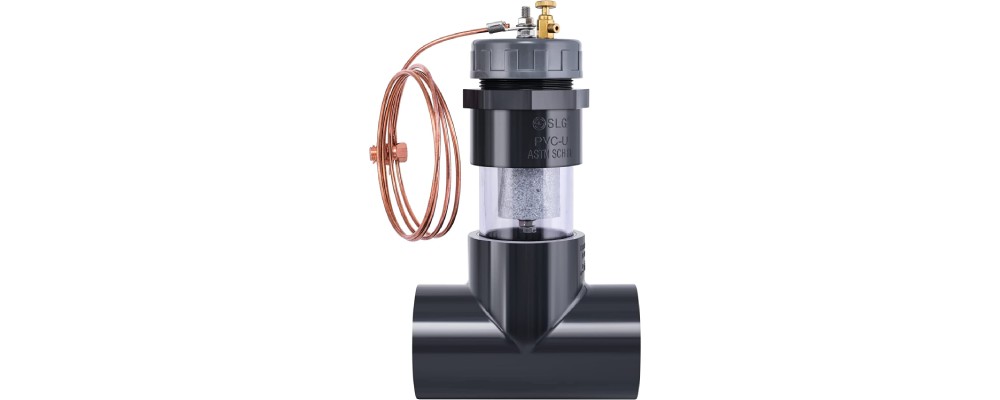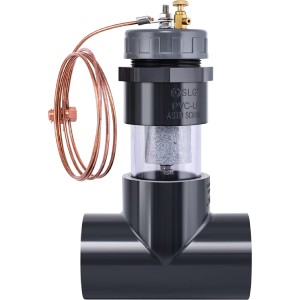Zinc Anode
A zinc anode is a device that protects metal components and hardware from corrosion in a salt water pool by conducting electric currents that pass through the salt water when chlorine is produced. The sacrificial anode anti-electrolosys device is relatively easy to install, affordable and available in numerous shapes and sizes depending on where you would like to install it in your pool.

It can get confusing when it comes to pool chemistry but the principal behind a sacrificial anode is relatively simple. Instead of electricity flowing through your pool water to other metal components in your pool it will be attracted to the zinc anode. The zinc anode will break down over time and sacrifice itself so that nothing else that is metal in your pool is affected by electrical corrosion. When used as part of a salt water pool system it will ensure that there isn't any damage or corrosion to metal pool hardware including internal components.
How a Zinc Anode Works
Zinc anodes have been used for decades in the marine industry for many different applications including electrical sacrifice. The simple function that an anode has is to corrode or sacrifice itself before other metals that are part of the same underwater electrical system. This system could be as large as a lake or as small as a water heater but you can be sure that your swimming pool is protected from electrical corrosion. In a pool the metal components that an anode will protect includes a ladder, steps, pool heater components or anything at all that is metal.
Anything that is metal and immersed in your salt water swimming pool is producing an electrical voltage. The salt cell inside the salt water system acts to break down salt into sodium and active chlorine to fight bacteria in your pool through the passing of electrons. This means that anything that is metal and in contact with your pool water could be at risk of conducting an electrical current and corroding. These items may be at risk of corrosion, degrading or discoloration if your pool chemistry is left out of balance for an extended period of time:
- Heater
- Filters
- Fittings
- Steps
- Ladders
- Light Fixture Housings
The way that a zinc sacrificial anode works to protect metal in your pool is by a process called cathodic protection. The zinc has a more active voltage than the other metal and therefore will break down before any damage is done to the surrounding metal, protecting it. The offending forces of oxidation and reduction take place on the sacrificial anode instead of metal in your pool. Understanding how to calculate your pools LSI score can help prevent any corrosion or scaling deposits.
If you decide to use a sacrificial anode it's important to check the condition of the metal and replace if it is broken down or degraded. An anode should last at least 6-12 months and it's often sufficient to check the anode yearly during pool opening or closing.
Inline Sacrificial Zinc Anode for Salt Water PoolsIf you click on this link and make a purchase, we may earn a commission. |
Is a Zinc Anode Really Necessary?
It's difficult to say whether a sacrificial anode is absolutely necessary for every salt water pool owner. There are a lot of variables that include the overall water chemistry and the types of metals present in your pool system. In most cases the metal used for ladders, steps and light housings is high grade stainless steel which should resist any corroding. In some older pools we have seen that these surfaces have corroded but is probably due to a lower grade of steel or steel plating.
In the realm of pool chemistry it's often difficult to give a blanket answer because of the many variables. We do know that a pool that is kept perfectly balanced at 7.4 pH can still experience galvanic corrosion from the salt water in the pool. Proper pH balancing is important but won't always prevent all corrosion because there are other factors including alkalinity and chlorine production.
If we were to give an answer on whether we recommend a sacrificial anode the answer would be yes but of course use your own judgement. If you know that your heater is salt water safe and your ladder is high grade stainless steel you probably don't need to worry about it. On the other hand if you aren't sure an anode is an affordable way to get some peace of mind and prevent costly damage to hardware or sensitive pool surfaces.
Zinc Anode Installation
If you decide on installing an anode the most important part of installation is to ensure that it's connected to the bonding wire of your existing pool system. The bonding wire should encompass the entire electrical system of your pool and by connecting the anode to this you are protecting your entire system.
The most optimal placement is an in-line device between the filter and the heater. The anode sits in a "T" PVC junction and can be plumbed in pretty easily by a handy pool owner. This type of anode can be replaced by simply unscrewing the cap, removing the old and worn sacrificial anode and replacing with a new one. You should expect to replace it every 6 to 12 months as part of your regular pool maintenance routine.
There are a different types and models available on the market today. They range from a device that sits in your skimmer basket to the more complex units that plumb into your pool system. If you feel that a zinc anode is right for you be sure to find one that fits your individual needs. If you want peace of mind and don't mind spending a bit of money you will be glad you decided on adding this handy device to your salt water pool.
Disclaimer
Please use all appropriate and proper safety precautions when attempting projects on this website. All projects are attempted at the reader's own risk.
Salt Water Pool and Spa™ participates in the Amazon Services LLC Associates Program, as an Amazon Associate we may earn a commission from qualifying purchases.
